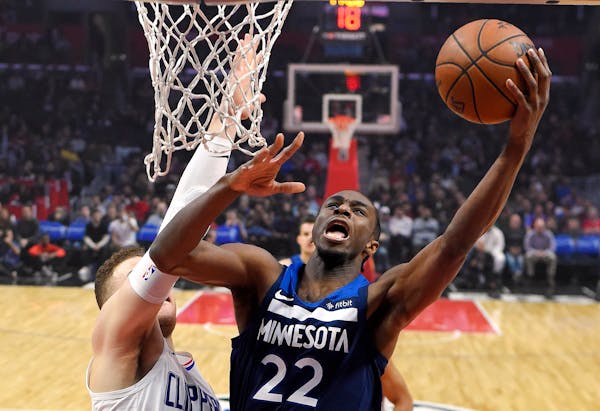Every game, Jamal Crawford warms up only to cool back down again.
He will fire up dozens of shots before the game, then take a seat until he enters, which is usually late in the first quarter. Even in Crawford's 18th NBA season, trying to stay warm while sitting on the bench still has not become routine.
"It's tough. I kind of look at it as if you're playing [pickup] at Life Time Fitness or LA Fitness and you played a game and you lost," the 37-year-old Timberwolves guard said. "It's a packed gym, and you have to wait another 45 minutes before you got back in. That's tough to do, you know?"
When Crawford enters, he has no time to waste to find his touch. You can't afford to when your minutes are limited (18.9 per game) and your team expects you to be a scorer during that time. So Crawford tries to lock in from the moment he steps on the floor.
"The only way to score is to shoot," Crawford said. "So you kind of have to do that."
Which is one reason why Crawford, who averages 10.0 points per game, leads the Wolves in one advanced statistic — usage rate, which makes it vital for the Wolves that Crawford play well when he is on the floor. Usage rate is an estimate of the percentage a given player "used" his team's possessions — either by taking a shot, getting to the free-throw line or committing a turnover — in the time he was on the floor. His rate of 25.1 percent slightly outpaces Jimmy Butler's (24.5) entering Monday's game at Atlanta.
So even though Crawford might rank sixth on the Wolves in shot attempts per game (8.8) and attempted free throws (1.6) and is sixth worst in turnovers (1.1), he is busy when he is on the floor — busier than any other Wolves player in those categories.
He is most likely to play with multiple members of the bench, such as Tyus Jones, Gorgui Dieng and Nemanja Bjelica, and one or two starters.
So when Crawford is in the game, he is often the focal point of the opposing team's defense.
"He's a threat, and people have to game plan for him," coach Tom Thibodeau said. "Probably the thing that gets overlooked some is his playmaking ability. He's been blitzed a lot in his career when you score the way he has scored the ball. What that does is if we make the right reads and get to the right spots, we can get easy offense off that.
"It doesn't take him much to get going."
That's how Crawford has to play, considering he is also playing fewer minutes than at almost any point in his career. Thanks in part to Thibodeau's propensity to play his starters heavy minutes, Crawford is on track to play his fewest minutes per game of any season outside his rookie year. But he's fine with the tradeoff if he is playing for a competitive team.
"There was a point in my career where I was tired of losing," Crawford said. "I was being known as the guy who was a good scorer on bad teams. I've always prided myself on winning. … I got to that point that I'll do whatever it takes."
The Wolves are getting what they paid for when they signed Crawford to a two-year deal worth nearly $9 million. His field-goal shooting (42.2 percent) and three-point shooting (33.7 percent) are in line with his career averages. They are also getting a player more known for his offense than defense. Crawford's net rating is minus-5.8, meaning the Wolves allow 5.8 more points per 100 possessions (roughly the length of an average NBA game) when Crawford is on the floor than they score.
But even though Crawford leads the team in usage rate, he isn't absorbing a high number of the Wolves' possessions relative to the rest of the league. He entered Sunday ranking 63rd in the statistic leaguewide for players averaging more than 15 minutes per game. That speaks to how much the Wolves like to spread the ball around, especially among the starters.
Last season, it was Andrew Wiggins and Karl-Anthony Towns who were driving the offense with usage rates of 28.8 percent and 27.4 percent, respectively, both numbers that were significantly higher than Crawford's this year.
While Crawford is playing fewer minutes, he is still going to make the most of the minutes he is on the floor. If he misses his first shot, or even his first few shots, he's going to keep shooting.
"I don't get discouraged, I really don't," Crawford said. "Like, if I miss a few shots in a row … you just keep going, you have tunnel vision, and just try to make the play, the play to win."
When Crawford is in the game, he isn't going to shy away from trying.
Chris Hine is the lead writer for North Score, the Star Tribune's new sports analytics beat. Find his stories at startribune.com/northscore.

Wolves-Bulls game preview: Broadcast information, injury report, key players

RandBall: Will Max Brosmer's success influence P.J. Fleck's approach to quarterbacks?

MIAC title game might be Bethel vs. St. John's, but others have something to say first

